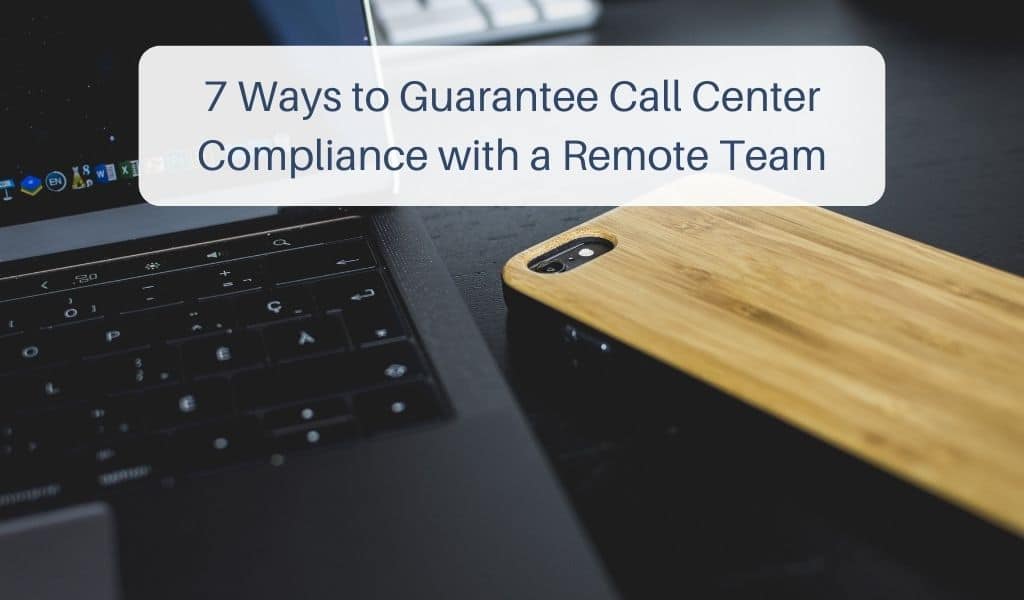Remote work makes call center compliance more challenging than ever. Here’s how to make sure that your teams are playing by the rules.
Since the introduction of the Telephone Consumer Protection Act (TCPA) in 1991, call centers have faced increasingly strict measures set by regulatory agencies to limit the potential intrusions of telemarketing on consumers. Enforcing these rules for call center compliance has always been a bit burdensome for telesales businesses. Still, it was doable when owners and managers had more direct oversight of their employees.
Now, with so many people working remotely—and operating under the assumption that remote work will continue in some form for a while—ensuring call center compliance is a much more daunting task. Without a centralized, controlled environment like the office, it’s hard to know exactly what employees are doing from home and whether or not their activities remain within the guardrails of the law.
Still, call center compliance in remote environments isn’t impossible. There are a few simple things you can do to make sure everyone is doing their jobs and playing by the rules.
Call Logic’s auto-dialer software brings you closer to call center compliance than many of the tools available today. Learn more by scheduling a free demo to see all the great features we offer!
Making call center compliance work when your team is remote
1. Enhance compliance training
It’s a good idea to provide regular training to all employees, new or otherwise, so everyone remains up-to-date with current and evolving legislation. This is particularly true with remote workers. Offer regular, interactive virtual trainings, so your teams know precisely what it means to be compliant from their home offices.
Even if you use software or other tools that help with compliance, a best practice is to train employees anyway. Software is an excellent investment in call center compliance—we’ll talk more on that in a moment—but adequate education that leads to employee understanding goes a long way in ensuring everyone follows the rules.
2. Use compliant software
Speaking of call management software, some of the better auto-dialer CRMs out there, like Call Logic, are programmed to be compliant with many of the regulations. TCPA compliance is especially useful with your call software, but other consumer protection laws (GDPR, HIPAA, etc.) are just as important. Even if your call center dialer doesn’t have a way to adhere to these guidelines automatically, most of it can help you keep your teams informed and on track. Just remember that no matter how compliant your software may be, the responsibility to keep everyone honest still falls on you and your business, so don’t take anything for granted.
3. Remote work risk assessments
If possible, conduct remote work risk assessments to guarantee call center compliance with off-site employees. Some employees may find this a bit intrusive, so as a best practice, we recommend being sensitive to that. Still, you have a business to protect, and you do have the right to understand the types of environments that your employees are working from. Some things to investigate might be internet security, the amount of privacy each employee has (i.e., it’s hard to keep someone’s information secure if your employee is working in the same room as their partner), and whether or not they’re working in a place with voice-activated virtual assistants, which can accidentally pick up and store confidential information.
4. Audit technology security
A secure internet connection is critical for call center compliance, as is providing other tools designed to protect against the distribution of a consumer’s private information. Employees should work from private, secure connections that aren’t shared with anyone outside of their households. When possible, require VPNs or other encryption technology to further reduce the risk of compliance issues. Employees also shouldn’t use personal computers or devices to view or store customer information—even if they’re using cloud-based software since system caches and other memory components can store data without a user’s knowledge. If an employee lacks any security at home that an office would otherwise provide, it might be a good idea to invest in the tools they need to avoid any problems down the line.
5. Clearly define prohibitions
Just as you might do with an employee handbook, call center compliance best practices clearly outline the things that employees are not permitted to do in a remote setting. For example, suppose an employee decides they’re bored of their home and they’d rather work from somewhere else. In that case, it’s helpful to have a policy that specifically prohibits using public wifi networks, especially if they’re unsecured. The prohibition mentioned above of using personal equipment should also be specific and understood by every employee. We recommend consulting with a qualified legal professional when developing these policies, but once you have them, you’ll be able to rest easier knowing your teams aren’t putting your business at risk.
6. Require remote work affidavits
While not required by law, remote work affidavits not only help to establish the do’s and don’ts of remote work for your teams, but they can also help boost accountability among them. An affidavit still may not shift call center compliance responsibility from a business owner or manager, they do ensure that employees understand how they are expected to conduct business. They can also give those same employees a sense of ownership—and accountability—when working remotely.
7. Use metrics to your advantage
Many call management systems available, including Call Logic, allow you to track certain metrics that can help you make sure your employees remain compliant. Get the big picture behind things like what time calls are placed, whether or not customers are on a do-not-call list, and other metrics that offer insights into call center compliance. You can also review recorded calls or take advantage of real-time whisper coaching functionality to get a glimpse into what’s going on in remote work environments.
It may take a little more work to maintain compliance when your team is remote, but it’s hardly impossible. Just be sure that everyone understands the importance of following the rules and regulations.
Let Call Logic do some of the heavy lifting in maintaining compliance. Contact us today for a free demo to see how we can shoulder some of this burden for you so your teams can spend more time focusing on their customers and growing your business.

